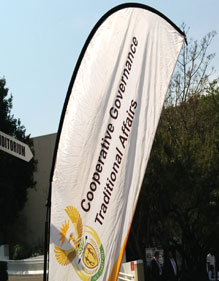
The blacklists would carry a term of 10 years, during which the employees involved would be barred from working in any government department or entity. For this and other measures that promise an overhaul of local government, we make Cogta our hero for the week.
The minister spoke at the local government summit in Midrand on Thursday 18 September.
Gordhan envisions cleaner, better governed municipalities, but cautioned at the presidential local government summit last week that it takes everyone in the country to make local government work. Addressing the press on the day before the summit, the minister revealed that he had written to MECs, asking them to explain why senior officials with chequered pasts are still being employed in local government.
News24 reported on Thursday that Gordhan and his deputy, Andries Nel, also told journalists that regulations that the department is to put in place would ensure that candidates with a history of misconduct couldn’t simply be hired in another municipality.
“We have to show the people of South Africa, [that] municipalities are not a hopeless case,” Gordhan said at the summit, which was attended by ministers, premiers, mayors, executive mayors, municipal managers, speakers, chief whips, technical officers, traditional leaders, and other senior local government officials. The country’s 278 municipalities were represented at the event, where President Jacob Zuma delivered the keynote address.
Another positive move by Cogta was the introduction of lifestyle audits, which Gordhan said would be used to detect fraud and corruption in municipalities. In the event that these crimes are indeed detected, civil action would be taken, even against private companies, to recover monies lost.
Moneyweb lists the following as priorities set by Gordhan for municipalities to “get back to basics” and improve service delivery:
- Dysfunctional municipalities should start delivering “at the very least, basic functions of local government.” The department will ensure this by enforcing policies and legislation, managing performance and accountability, and ensuring there are consequences for non-performance.
- Municipalities that are functional but not doing well enough in critical areas will be supported to do better. The focus will be on building strong systems and processes and ensuring vacancies are filled with capable people whose performance is closely monitored. Municipal oversight will be improved through the creation of real-time monitoring systems.
- Well-performing municipalities will be incentivised by giving them better flexibility and control over their resources and grants, and encouraging them to tackle more complex problems like transforming the special development and develop integrated communities.
- There will be “targeted and vigorous response to fraud and corruption and close oversight over supply chain management”. Where things go wrong it will be dealt with decisively, using tools like asset forfeiture and civil claims.

